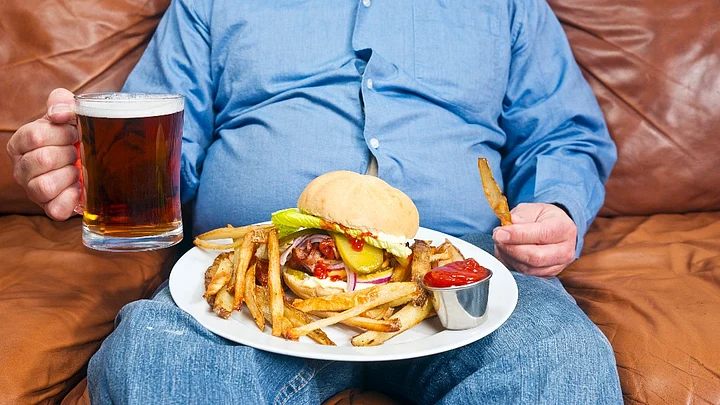According to the US Department of Health and Human Services, binge eating disorder (BED) is a common type of feeding disorder in the US and around 2% of the people around the world suffer from the condition and people now can get medically diagnosed for the same.
According to Healthline, binge eating disorder or any eating disorder for that matter is more than just overeating, it is a psychiatric condition and deals with deeper issues like depression and anxiety at times.
In this article, we shall bring forward the causes, symptoms, diagnosis, and treatment of BED.
According to PubMed Central, people experience a sort of relief after food consumption but are overwhelmed with feelings of guilt and loss of control later. Studies also show that people suffering from BED experience extreme negative emotions like unhappiness and shame about their feeding habits, weight gain, and suffer from low self-esteem.
How Is Binge Eating Disorder Different From Other Eating Disorders?
According to the American Psychiatric Association, BED is a serious mental health issue that causes abnormal and dangerous eating behaviour in people which gives rise to various other chronic health issues like cholesterol, obesity, blood pressure, and heart-related problems.
People usually end up eating too much until they feel uncomfortable, start eating even when not that hungry, eat at a faster pace and end up feeling disgusted, depressed, and embarrassed about the behavior.
According to PubMed Central, BED is different from other eating disorders like anorexia and bulimia as patients are not image-conscious, do not indulge in an excess workout at once, are not underweight, do not throw up their food after meals, or do not starve themselves to a limit where they fall sick.
Binge Eating Disorder: Causes
According to American Psychiatric Association, the causes or risk factors of BED include:
Genetics: There is a strong evidence that BED can be inherited and patients also suffer from dopamine sensitivity, a hormone responsible for the feelings of extreme pleasure, reward or comfort.
Gender: According to the U.S. department of Health and Human Services, about 3% percent of the women in the US suffer from BED and more than half of the BED patients are women.
According to the US National Institutes of Health, people with BED may also undergo certain changes in the brain structure due to which they behave in a certain way towards food and lose control.
According to Healthline, 25-50% of people with body image issues suffer from BED and 80% of the patients suffer from some kind of psychological disorder like phobias, PTSD, bipolar disorder, depression, etc.
Binge Eating Disorder: Signs and Symptoms
According to the doctors of the Cleveland Clinic, people with BED suffer from some of these or all of the symptoms mentioned here:
Consumption of a large amount of food
Dieting with no results
Eating even if not hungry or feel full
Loss of control over eating behavior
Rapid binge eating episodes
Eating in secret
Feeling depressed, embarrassed, ashamed, or disgusted about eating behaviour
Binge Eating Disorder: Diagnosis and Health Complications
There is no particular test to diagnose BED but your doctor may ask you certain questions to analyze your eating habits, relationship with food, and binge eating behavior. Certain characteristics that help doctors diagnose BED include:
At least one binge eating episode in a week
The condition may be mild with 1-3 binge eating episodes in a week or severe with up to 14 binge-eating episodes
Not trying to undo the binge eating episode by laxatives or throwing up like in bulimia or anorexia.
There are certain health complications that also are a result of binge eating disorder and raise a high risk for the patient and some of the resulting complications include (Cleveland Clinic):
Depression, Anxiety, or Mood-related disorders
High Blood pressure
Gall Bladder problems
Risk of certain cancers
Obesity
Binge Eating Disorder: Treatment and Management
According to the doctors of Mayo Clinic, if not treated, binge eating disorder can affect a person's mental and physical health for years and can even lead to death.
But people often leave it untreated thinking they can overcome the condition on their own. But it is a misconception and it can be overcome with the right treatment, behavior, and strong willpower. Here are a few treatment options that can help:
Psychotherapy is nothing else but talking therapy with medical experts which can help you replace your unhealthy patterns and habits with healthier ones. Cognitive therapy may help you behave differently in situations (when you feel depressed or down) that triggered your binging episodes earlier and can help gain control over your feeding habits. Interpersonal psychotherapy helps you focus and improve your relationships with family and friends which might be the underlying cause of your BED.
There are certain FDA-approved medications that can help you get rid of your BED but they have serious side effects including the less problematic ones like dry mouth and insomnia. Lisdexamfetamine dimesylate, Topiramate, and antidepressants are a few of the medicines that shall be prescribed by your doctor.
Though these medicines should be taken under the expert's guidance, you can try to incorporate certain habits to prevent yourself from binging episodes. It can be as simple as having healthy food around, the right sleeping pattern, avoiding bringing junk food in the groceries, asking your family for help, etc.
(At The Quint, we question everything. Play an active role in shaping our journalism by becoming a member today.)
